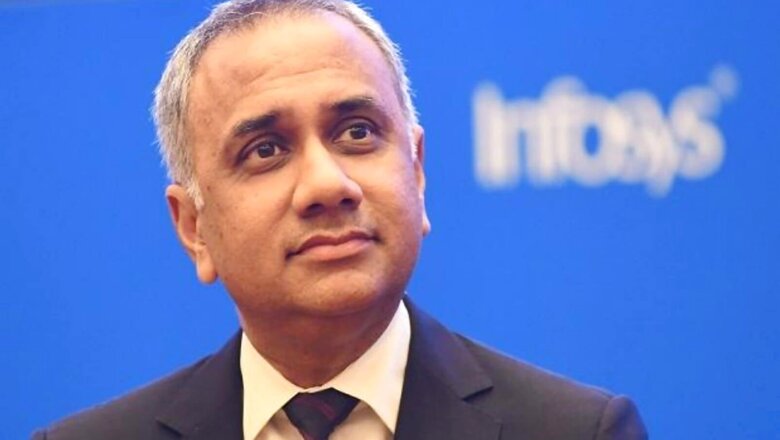
views
As if India’s image as an investment destination hasn’t suffered enough, the Income Tax department has added its might to make things appear even worse. It not just “summoned” the top Infosys executive about glitches on the income tax portal but also announced this grandly on Twitter.
“Ministry of Finance has summoned Sh Salil Parekh,MD&CEO @Infosys on 23/08/2021 to explain to hon’ble FM as to why even after 2.5 months since launch of new e-filing portal, glitches in the portal have not been resolved. In fact, since 21/08/2021 the portal itself is not available,” the department wrote on Twitter.
Essentially, it is a client-vendor issue. The vendor, Infosys in this case, has failed to live up to the expectations. The client, the Ministry of Finance, could have discussed the matter with the vendor and sorted out the issue. If there are some shortcomings in the delivery, the company could be penalised.
Just because the client happened to be a department enjoying enormous powers doesn’t mean that these should be used to bully the vendor.
This is not to say that Infosys is being unnecessarily victimised. There is nothing in the public domain to suggest that the IT major is being harassed. The company rendered its services for which it has been paid money.
“The contract for Integrated e-filing & Centralized Processing Centre (CPC 2.0) Project was awarded through an open tender published on Central Public Procurement Portal (CPPP) to Infosys Ltd, the Managed Service Provider on the lowest cost basis. Since January 2019 till June 2021, the total amount paid to Infosys is Rs 164.5 crore under this project,” Minister of State for Finance Pankaj Chaudhary said in a written reply to the Lok Sabha in the last week of July.
As for the glitches, finance minister Nirmala Sitharaman said a few days ago, “The glitches on the new site are expected to be fixed entirely in the next two-three weeks.” She further said, “I have been reminding Infosys constantly and Nandan Nilekani is giving me assurances that they will sort it out.”
All this suggests that the government and the company have already been sorting out the issue.
In this context, another issue needs to be pondered over — that of the lowest bid. The government procures goods and services which are the cheapest. On the face of it, there is nothing wrong with this; even big corporations do that. But one-size-fits-all policy doesn’t seem to be working very well with government. In 2013, for instance, Huawei won the bid to supply CDMA phones to public sector BSNL because of its lowest bid, but it failed to supply the instruments. This brought to the fore problems associated with such a bidding system.
In HT’s report in October 2019, the Chief Vigilance Commission (CVC) questioned the appropriateness and efficacy of the lowest bid or L1. “After discussions, it [CVC] has concluded that while the L1 system may still be good for procurement of routine works and non-consulting services, but for high impact and technology complex procurements, this method may not be able to cater to today’s need for innovation, quality, speed, functionality, efficiency.
Little has been heard about the subject since then. There was a report last December in The Print about some positive development, “The Narendra Modi government is considering a Niti Aayog proposal to review the way bidders are selected for public procurements.”
The e-filing portal, involving crores of users, surely needs hi-tech solutions. If the tendering of such services is constrained by the age-old L1 system, it may not be very realistic to expect the delivery free from any hiccup.
India’s IT majors compete with their international rivals all over the world — and do it quite successfully. This is the reason that the sector is still doing well in our country. So, there is no reason that why an iconic IT company should perform so poorly in a project that affects so many people. However, good performance costs money; it could have been done had the government devoted some time and effort in this direction. But it is so busy in event management and political messaging that it finds little time for meaningful and real work.
In fact, the tweet itself, with the use of the word “summoned” seems to be political messaging; the usage seems to have attracted so much attention to the tweet. It could have been phrased as “Sh Salil Parekh, MD&CEO @Infosys will visit on 23/08/2021 to explain to hon’ble FM…” But it would have robbed the government of its anti-big business stance.
And if the government didn’t appear to be anti-business, how could it project itself to be pro-poor? Hence the tweet. And hence the use of the offensive word, summoned, as if Parekh were a fugitive billionaire. Such are the perils of populism.
(The views expressed in this article are those of the author and do not represent the stand of this publication.)
Read all the Latest News, Breaking News and Assembly Elections Live Updates here.

















Comments
0 comment